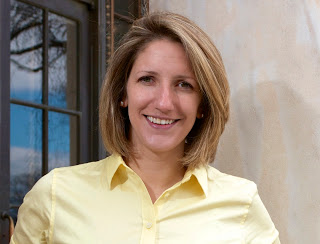Mathematics Ph.D. Student Haensch Receives Mass Media Fellowship

When Anna Haensch tells new acquaintances that she’s a mathematician, many people immediately recoil.
“There’s this repellent nature to math,” she said. “There’s this big wall up around it—people find it terrifying or uninteresting.”
That’s exactly why Haensch, a Ph.D. student who just successfully defended her dissertation, wants to learn how to communicate better to the general public about math. She is the recipient of a Mass Media Fellowship, administered by the American Association for the Advancement of Science (AAAS). Haensch’s fellowship is sponsored by the American Mathematical Society (AMS). The 10-week summer program, which starts June 3, places graduate and post-graduate level science, engineering and mathematics students at media organizations around the country, where they develop skills to translate their work to the public. Haensch will be stationed at the NPR Science Desk in Washington, D.C.
She was one of two mathematicians selected for the prestigious fellowship this year. Thirteen fellowship recipients in other scientific fields will be stationed at media outlets such as the Chicago Tribune, the Los Angeles Times, NOVA, Scientific American, and WIRED.
Haensch, who earned her undergraduate degree at the State University of New York at New Paltz, has been at Wesleyan for the past six years, working on number theory under Professor of Mathematics Wai Kui Chan.
“I plug integers into polynomials and see what integers I get out,” she explained. “This is a question that’s really easy to ask, but it’s very hard to get our hands on the solution. Over the last several hundred years, this has been a question people have been very interested in.”
After passing her qualifying exams at Wesleyan, Haensch began teaching courses in pre-calculus and calculus to undergraduates, beginning in her third year. She recently accepted a tenure-track position teaching math at Duquesne University in Pittsburgh.
Haensch said her professors at Wesleyan have inspired her to think about clear communication of complex and technical subjects.
“Wesleyan faculty members care a lot about being good teachers—having good presence in the classroom and presenting material in a very thorough way. Being in that environment has made me put a premium on my own teaching skills, and my ability to explain concepts to people,” she said.
As a woman in mathematics, Haensch is also particularly interested in communicating effectively to other young women how exciting the field of math is. She hopes to inspire middle school and high school girls to consider pursuing math or science. For the past few years, she also has enjoyed writing a blog about her experiences as a woman in a mathematics graduate program.
Though Haensch has never considered pursuing journalism, she said, “I really, really, really love NPR. I listen to it every single day. It’s my alarm in the morning, and I listen to it before I go to bed at night.”
She mentioned this passion during her interview for the fellowship, which may have contributed to her placement at NPR’s Science Desk.
During the fellowship, Haensch said she will take part in daily morning meetings at which reporters pitch story ideas. The fellow at NPR last year warned Haensch that many of these ideas will be shot down, but urged her to keep trying. If a story idea is picked up, Haensch will be called upon to research the topic and write a story for the NPR website. An on-air reporter might also deliver the story on the radio.
Haensch said she is looking forward to learning how to “take extremely dense technical information and distill it into something approachable.” In her application to the fellowship, she was required to re-write an article recently published in an academic journal as a 750-word story for the general public. “It was an interesting mental exercise to filter through it and see what in this story is actually illuminating, and what is just technical data that doesn’t contribute to the narrative. That’s something I’d like to learn more about—as a person of science, an instructor of mathematics, and someone who’s hoping to encourage young people to study math.”
Chan, who has been Haensch’s advisor since Fall 2009, said she is “a very hard-working student, and she always strives for the best.” They two have already had a joint paper accepted for publication, and Chan expects Haensch will have two or more additional publications based on the results she found in her thesis.
“Not only does Anna excel in mathematics, she is also an extremely talented teacher. She can reach out to students and explain to them complicated mathematical concepts in a crystal clear manner. I believe the Mass Media Fellowship will give her more and better opportunities to utilize her communications skills, so that she can reach a broader audience and help the general public understand more about the mathematics community—how our work helps he other science fronts advance, for example,” he added.

